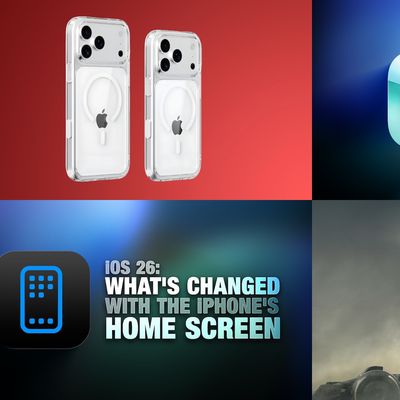Apple has won a patent for a dual monitor stand that appears to be based on the "Pro Stand" design option for the Studio Display and Pro Display XDR.
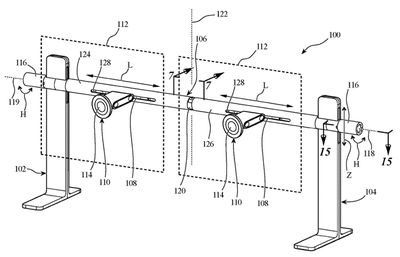
The patent filing first surfaced in 2020, but now the United States Patent and Trademark Office has officially granted Apple the patent. The granted patent, spotted by Patently Apple, is simply titled "Dual Display Stand," and details a mechanical design that seeks to address the shortcomings of existing multi-display solutions, offering easy and precise adjustment for up to two external displays.
The filing outlines a large display stand with two spaced-apart legs, connected by a horizontal support bar that allows two displays to be mounted. The stand allows for a high level of precise adjustment and control, with vertical, horizontal, and center pivot degrees of freedom. Apple offers a brief description of the improvements offered by the stand in the patent:
The display stand provides improved smoothness, rigidity, and comfort for the user to support and use multiple displays on a single stand.
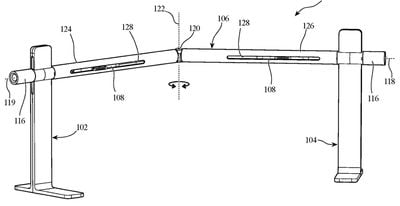
The stand seems to use the same moveable joints as the existing Pro Stand for the Studio Display and Pro Display XDR, but places them on rail shuttles for horizontal adjustment. A central joint on the support bar allows the stand to adjust the angle between the displays.
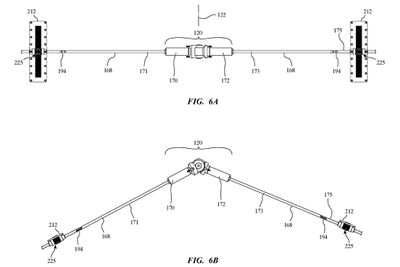
The stand has handles on each side that can be twisted to easily adjust the height of the support bar for exact vertical adjustment. The patent notes that the entire bar is lifted regardless of the angle of the support bar or which handle is turned.
The patent also stresses that the shuttles on the continuous rail provide "smooth, consistent contact" with the rails despite adjustments to the support bar using wheels.
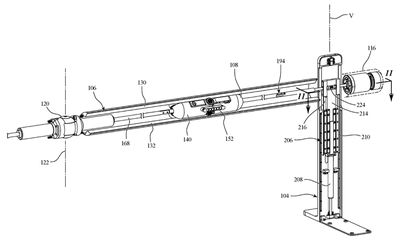
The filing explains why the Dual Display Stand solution may be better than existing third-party stand solutions such as independently-movable VESA-mount arms:
When users use multiple displays in a workspace, the displays are generally supported by multiple different individual stands or by independently-movable arms that extend from a single support point. These individual stands or arms unnecessarily take up large spaces, are often aesthetically unpleasing, overcomplicated, and have inefficient redundant mechanisms. When multiple displays are used on independent arms, they can be difficult to align in a smooth and precise way due to inconsistent counterbalancing and arm lengths. When multiple displays are used on a single support, they cannot be effectively adjusted relative to each other about a vertical axis.
When it first emerged in 2020, it was striking how far developed the patent filing was, effectively outlining an entire product. Normally, Apple's patent filings focus on a specific part of a device or system, and while the dual display stand's mechanical operations are all able to come under a single filing, there are very clear similarities to the existing Pro Stand alongside a pronounced level of detail for a hitherto unknown Apple accessory.
Given this level of completeness, it is possible that Apple may be planning to bring the Dual Display Stand to customers at some point in the future. There is also a chance it may be reserved for internal corporate use or simply for retail store display units. That being said, patent filings only reliably show what Apple is researching and developing, and many aspects detailed in its patents never materially emerge.
It is worth noting that while the Pro Display XDR's stand is interchangeable thanks to a magnetic mounting system, the Studio Display's stand is not and it must be configured with the preferred stand upon purchase. This means that any new dual display stand for the Studio Display would similarly have to be configurable at the point of purchase, with different options available for the Studio Display and Pro Display XDR. It is also possible that by the time any such accessory would be available, future iterations of the Studio Display and Pro Display XDR could feature improved mounting systems.
Apple's Pro Stand for the Pro Display XDR, sold separately from the display itself, caused controversy when it was announced in June 2019 for its $999 price tag. In March this year, Apple brought the same height- and tilt-adjustable stand design to the Studio Display with a $400 add-on option. At minimum, the patent suggests that Apple's work on new mechanical display stands is ongoing.







